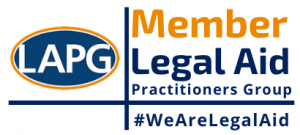Who is now eligible for legal aid?
New legislation came into force on 1 April 2013 that changed who is entitled to public funding in private family law matters.
What is private family law?
Private law matters are those concerning relationships between individuals. In family law, the main private matters are:
– Divorce proceedings, dissolution of civil partnerships, separations
– Any related financial matters to be resolved
– Any related children matters to be resolved, such as contact between children and the non-resident parent, and decisions about the residence of the child
– Any protective measures that may need to be taken within the family, such as ensuring you are not made homeless, or that the other party cannot contact you
The new changes mean that legal aid now only covers a limited number of situations within private family law.
Who does legal aid assist now?
– Victims of domestic violence if:
- Evidence can be provided (see below); or
- An injunction to protect against domestic violence is being applied for
– Parties in mediation, including the following stages:
- Willingness tests
- Assessment meetings
- Actual mediation, including: All Issues, Child Issues, Property and Financial
– Children
– Parties to cases concerning children, where there is evidence of child abuse (see below)
– Parties seeking forced marriage protection orders
How can evidence of domestic violence be obtained?
Key points:
– Legal aid will not be available for the process of obtaining evidence
– Only victims of domestic violence will qualify for legal aid, not perpetrators
Accepted evidence:
– If the accused party has any of the following, concerning a domestic violence incident:
- An unspent conviction
- A police caution
- Unfinished criminal proceedings
- A protective injunction against them (which is in force or was granted within the last two years)
- An undertaking has been made concerning an occupation or non-molestation order, or a forced marriage protection order
– If any of the following can be provided:
- A letter from a person who has chaired a multi-agency risk assessment conference (which is where local agencies discuss high risk cases of domestic violence that have been referred to them)
- A copy of a finding of fact that there has been domestic violence, from the last two years (in the UK)
- A letter or report from a health professional saying that the victim was examined within the last two years with injuries that they have no reason to believe were not caused by domestic violence
- A letter from a social services department saying that the victim has been assessed (within the last two years) as being, or at risk of being, a victim of domestic violence
- A letter or a report from a domestic violence support organisation (in the UK) to say that the victim was admitted to a refuge for twenty four hours or more, in the last two years, due to allegations of being at risk of domestic violence (including the dates of stay at the refuge)
How can evidence of a risk of child abuse be obtained?
– If the accused party has any of the following, concerning a child abuse offence:
- An unspent conviction
- A police caution
- Unfinished criminal proceedings
- A protective injunction against them (which is in force or was granted within the last two years)
– If any of the following can be provided:
- A copy of a finding of fact of abuse of a child by the accused, from the last two years
- A letter from a social services department confirming that, within the last two years
- A child protection plan was put in place to protect the child from abuse, or risk of abuse; or
- The child was assessed as being a victim of abuse, or at risk of being so
- An application for a protective injunction, made with an application for a prohibited steps order against the accused, which has not yet been decided by the court
We are happy to help you if you have any questions about the above, and whether you are eligible to receive legal aid.

